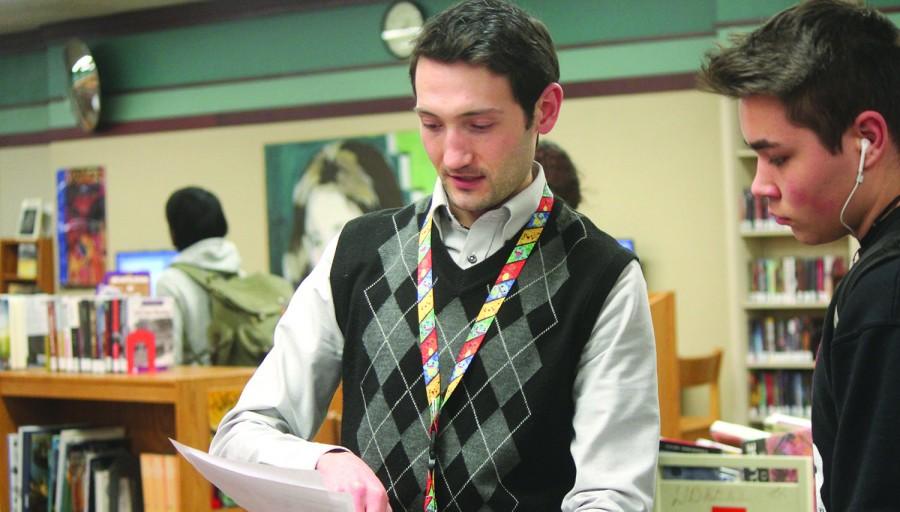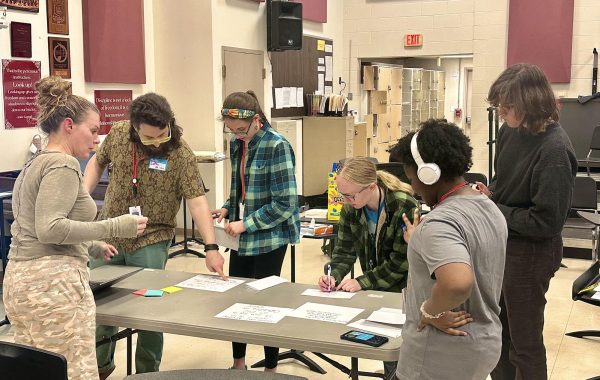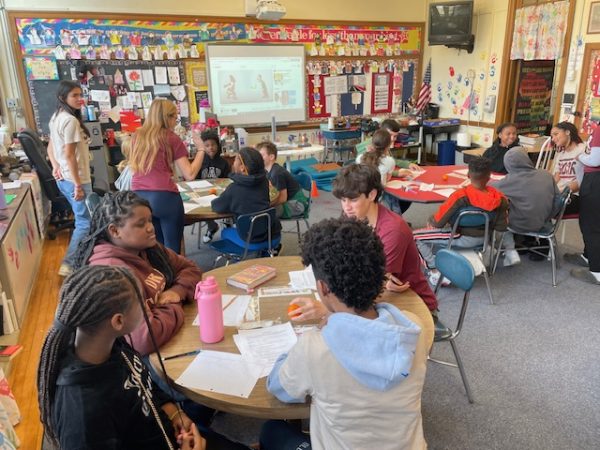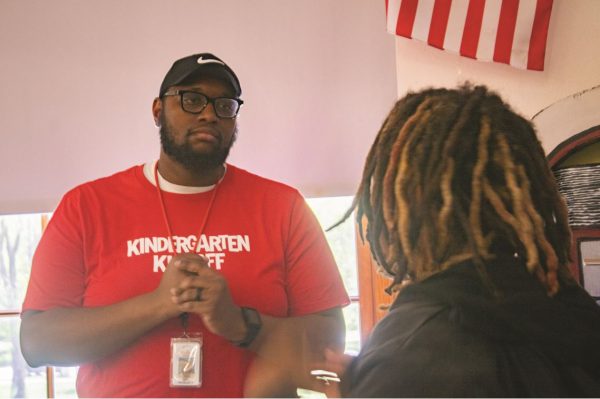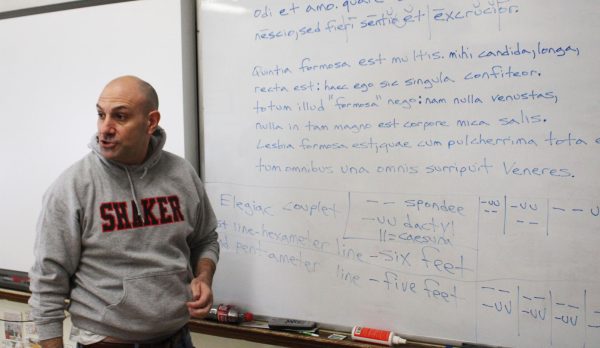MYP Certification Brings New Department Names
History, Social Studies, English get international revamp
The high school’s Middle Years Programme coordinator, science teacher John Moore, has overseen MYP integration in the high school. International Baccalaureate representatives will examine Shaker for possible MYP certification.
Late for English class? Joke’s on you — it’s not English anymore.
On April 27, a team from the International Baccalaureate offices will assess whether or not Shaker will achieve Middle Years Program authorization. In anticipation, Shaker changed department names for English, Foreign Language and Social Studies to Language and Literature, Language Acquisition and Individuals and Societies, respectively.
Shaker received authorization in its Primary Years Program and Diploma Program, but has yet to receive MYP authorization, which covers ages 11 through 16 and grades five through 10.
“What they’re trying to do is kind of bring some uniformity to the nomenclature here,” IB Coordinator and Individuals and Societies teacher Timothy Mitchell said.
“For instance, traditionally we used to call languages besides English here in this high school somewhat ironically, ‘Foreign Languages,’” Mitchell said, referencing the fact that the IB philosophy avoids referring to other cultures as “foreign” to retain an international focus.
Although Mitchell described changes such as the department name alterations as “cosmetic changes,” they are part of a larger plan: the coming judgement day on MYP certification.
Documents on the IB website, ibo.org, state that among the criteria a school must meet to qualify for MYP certification, the school’s educational beliefs and values must “reflect IB philosophy.” Shaker changed department names to meet this criteria.
Sophomore Ally Nordstrom has misgivings about the changes accompanying MYP certification. “I think that it’s unrealistic that people would actually think that way in everyday life,” she said. “It doesn’t have any value for our life . . . It’s not like we’re going to be smarter because of IB.”
High School MYP Coordinator and science teacher John Moore outlined the steps already taken to achieve authorization. “This is our third year of candidacy, and now finally, at last, all of our hard work in many ways is going to be recognized,” he said. Schools must apply for candidacy before being considered for authorization, as Shaker did in 2012.
According to Moore, it’s rare to have an entire district become IB-certified. “The most popular, by far, is the DP, followed by the PYP,” Moore said.
Moore said that state testing requirements may have contributed to the extended candidacy phase. “When DP and PYP went through, it was before the state decided to change all these things. As soon as we decided to begin our MYP journey, during our candidacy phase, that’s when all these state tests came down, that’s when the SLO’s [Student Learning Objectives] came down.”
This testing hasn’t just affected Shaker. “They’re trying to schedule 80 schools this spring, throughout the world, to go in to visit and, especially in the Americas, testing makes everything very compact,” Moore said.
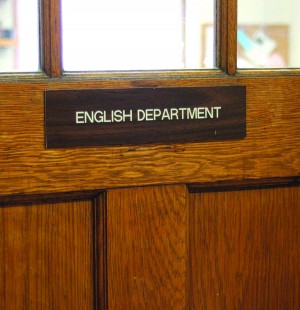
The visitation team, which will comprise three MYP coordinators from schools across America, arrives April 27 and will spend one day in the high school, half a day at Woodbury and half a day at the middle school. Exit interviews with coordinators, administrators and staff will make up the third and last day. The district rescheduled this visitation from its earlier Feb. 9 date to have more time to prepare.
In October 2014, Shaker sent Application A, or the “paper edition” of the process, off to IB offices, including written responses to all required authorization standards and practices. Moore said that feedback from this, which arrived in December, highlighted “assessment policies and organizing approaches to learning skills” as areas for improvement.
Moore and other MYP coordinators spent the following months addressing these areas. In addition to the ongoing implementation of the tenth grade Personal Project, IB requires additional evidence of following the international philosophy. The first 11 pages of the 2015-2016 Program Planning Guide, which also first mentioned new department names, are devoted to MYP policies and practices. Included are an academic dishonesty policy, a language policy, a special education needs policy, an assessment policy and an overview of the MYP.
“What you see in the Program Planning guide is an evolving document,” said Moore. “With the feedback from teachers and some really critical reflection from the district as a whole, that document is allowed to, in fact encouraged to, evolve, update and change with our district.”
Because the MYP applies to Woodbury Elementary School and the middle school as well as the high school, each new policy and rubric has to apply to all three buildings. This has led to an increase in what Moore and Griffith described as “vertical collaboration.”
This collaboration is evident in the new language acquisition opportunities for younger students. “MYP is very adamant that we give our students the opportunity to be as fluent as possible in a second language,” said Moore. “Because of that, we have to offer a second language to all of our students grades six through 12.” Starting this year all sixth graders can learn every language offered at the high school except Greek.
Although Nordstrom saw little need for the changes at the high school, she sees this language change as a positive one. “My brother’s going to be in sixth grade and he’s really happy about all the languages and that he could learn more,” she said.
Woodbury MYP Coordinator Amy Brodsky summarized other positives MYP-related changes in an email interview. “Developing and teaching units through the MYP framework puts a greater emphasis on conceptual teaching and learning,” wrote Brodsky. “Students are being exposed to content through a broader lens”
Additional changes include a new design course for Woodbury students and the implementation of “common planning time” for teachers to integrate MYP into curriculums.
Brodsky says Woodbury students responded positively to the MYP adoption. “ [Students] have all lived through the authorization process in their elementary buildings in the past, so much of this is not new,” wrote Brodsky. “It has been a relatively easy transition for our students since they are used to the type of work and language that IB promotes.”
“For Woodbury students, this is just ‘how we do school,’ ” Brodsky wrote.
Above all, Moore appreciates the hard work it’s taken to get to this point. “I’ve been to many schools. I went to an IB school when I was in high school. There is no other place that could possibly do what we’re doing now in the context that we’re doing it,” said Moore. “These people — teachers, staff — have been doing absolutely incredible work amongst and amidst all of these other changes in education.”
Principal Michael Griffith laid out the possible results from the MYP coordinators’ visit. “[The results] could be anything from ‘You’re totally, 100 percent on board’ to ‘You’re on board, but there are areas you need to continue to grow and work in,’ and there’s always the option that they could say ‘You’re not ready.’ ” Griffith said that the district is “not at all anticipating” not receiving the certification. However, the process may take longer than expected.
“Very, very rarely do schools get authorized directly after their visitation,” said Moore. “Usually they’ll give some feedback, some comments, the school responds and then there’s that authorization piece.”
The new department titles will not affect course offerings. “I don’t think it makes any difference,” said Mitchell. “It doesn’t change the courses, it’s just changing labels, as I understand it.”
“When you change a department’s name, it doesn’t change for us what’s included. It’s still going to be history and social science courses,” Mitchell said.
The department name changes do not bother Language and Literature teacher Jody Podl. “I’m just happy I get to continue teaching great works of literature,” Podl said.
The changes haven’t been embraced by all, however. Junior Anav Sood considers the changes unnecessary. “All you’re doing is convoluting generally accepted terms for the purpose of sounding extremely pompous for absolutely no reason,” he said.
“I didn’t acquire anything in my Latin class,” said Sood. “I learned a language.”
Nordstrom agreed. “I think [the department names] were good the way they were,” she said. “It’s not that important.”
Despite resistance to the changes, MYP is not optional for students grades six through 10. The Diploma Programme, on the other hand, is: students can choose whether to become IB Diploma Candidates. Even for diploma candidates, “it’s a different conversation because the diploma program is a program, and you can be removed from a program,” Griffith said. In the case of the diploma program, he said if a student breaks a policy he or she could be removed.
“If you broke an academic honesty policy, there’s a series of steps and processes and you could end up being removed,” said Griffith. “You’re not going to be removed from the Middle Years Program. It is our curriculum.”
Mitchell said that more significant changes relating to MYP certification will be seen in the future, with longer-term effects.
“I think what people will start seeing is efforts for teachers to integrate IB-style methods of inquiry, IB types of assessments and IB rubrics,” said Mitchell. “There’ll be a transition for that, but I think that’s actually something that will be positive.”
The results from the visitation could come as early as before the end of school this year, but that won’t be the end of Shaker’s MYP journey. “Authorization is not the close of the book. It’s the end of the introduction,” Moore said. Every five years, MYP representatives will physically come back to Shaker and check up on progress in a “re-evaluation visit.”
With the hoped-for authorization, Shaker aims to create a more fluid connection between buildings through MYP attributes that cross grade levels.
“I hope it will mean that when kids finish ninth and tenth grade, some of the things we do in the diploma program will appear more natural,” Mitchell said.

